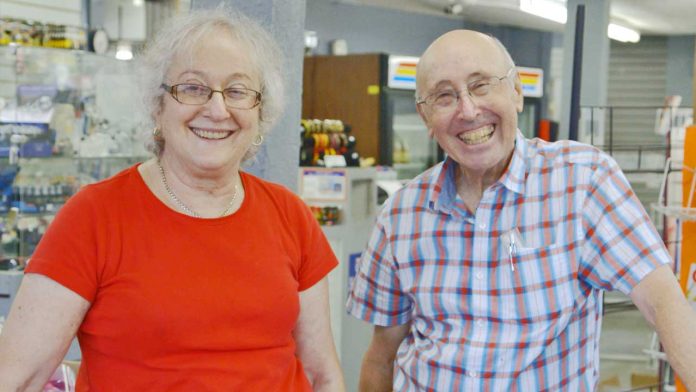Rachel Mason’s frisky documentary, “Circus of Books,” available April 22 on Netflix, introduces viewers to her parents, Karen and Barry, who owned the title hardcore gay adult bookstore in Los Angeles for more than 30 years. Their profession was largely kept a secret from their three children as well as their friends, given the attitudes toward pornography and homosexuality — especially in the store’s early years of operation. Karen and Barry created a safe space in the gay epicenter of West Hollywood with their store, Circus of Books. They also opened a second location in Silver Lake.
The filmmaker tells the story of her parents using home movie footage, interviews with employees and industry colleagues, observational footage — such as Karen entering the store’s adult room or attending an expo for sex products — as well as candid conversations with her parents and siblings. What emerges is a remarkable time capsule. From the early days of gay liberation to the onset of AIDS, and the current internet era, the film chronicles how social change occurred in and impacted the queer community and America over the past 50 years.
There is also a cornucopia of porn in the film, but none of it is salacious. Mostly Mason features shots of sex toys, naughty magazine covers and non-explicit video clips. Adult film star Jeff Stryker is interviewed showing off his anatomically correct action figure. In contrast, Larry Flynt as well as drag performer Alaska, who was once a store employee, talk candidly about pornography and the store, respectively.
The Masons explain, not surprisingly, that they did not set out to own a gay adult bookstore. Barry had been an inventor — and has an amazing story about developing dialysis equipment using his movie special effect skills — while Karen had a career as a journalist. When they answered an ad published by Larry Flynt (whom Karen once interviewed, ironically), they started distributing adult magazines. They soon bought Book Circus, a store that was behind in its payments. They reversed the store name and thought it would be a temporary job. However, the business became lucrative. The Masons eventually started working in the video industry, becoming the largest distributor of gay porn. In one of the documentary’s more amusing lines, Karen tells her daughter, “These videos sent you to college!”
“Circus of Books,” however, also shows that the business was not always an easy one. When an order for videos was shipped to Lebanon, Pennsylvania, the Masons were charged with a felony in a sting operation. Barry faced jail time, and this sword of Damocles hung over the couple, who kept the situation a secret.
There were also issues on the home front that tested Masons. When their son Josh worked up the courage to come out to his family, during a trip home from college, his father was accepting, but his mother did not react well. How she could be so supportive of the queer community through her work but not with her own child is one of the more interesting wrinkles. Rachel’s tearful discussion with her brother about his struggles and fears about being gay are quite heartfelt and moving.
How Karen and Barry come to support their son and provide lessons for other families is one of the more uplifting moments in the documentary. “Circus of Books” is certainly quirky with its scenes of Karen discussing anal lube, and it is somber when Barry talks about his shock that a father would disown his son for being gay or contracting AIDS. But it is also poignant when it discusses the sustainability of an aging, ailing business, and the way the queer community is losing its bars and bookstores, spaces where gay men used to meet and congregate. Yet the film does indicate that these changes come with the benefits of greater acceptance, marriage equality and other rights and privileges not available back in the day when there were police raids on gay bars.
While these themes are compelling, it is the indomitable character of Karen that makes “Circus of Books” so engaging. She is strong-willed, often telling her daughter not to film her, and even getting annoyed when Rachel tries to mic her in a parking lot. Karen’s attitude about religion is also quite revealing as it influences her opinions on homosexuality as punishment.
Mason’s documentary is worthwhile for taking a personal story of a family and a mom-and-pop business and turning it into a case study for the queer community and social change. The scrappy style of the film, like the store, is engaging. By the time “Circus of Books” ends, viewers who had been to the hallowed ground should have good memories, while those who never visited, will wish they had been able to visit.

